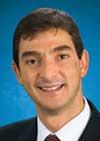With all the excitement during the trade show hours at The New York Produce Show and Conference — with activities ranging from vendors meeting buyers, students being mentored, chefs doing demos, consumer media immersion, the culinary-student education programs and much more – it is sometimes difficult for people to pull themselves away to catch a workshop.
But it is well worth the time commitment. We have been fortunate to have worked with many of the speakers for years, and they just never fail to exceed every expectation:
Cornell’s Ed McLaughlin just did a similar standing-room-only presentation at our Amsterdam event, which we wrote up:
Tom Reardon from Michigan State University, who does a kind of global research nobody else does, has keynoted our Global Trade Symposium, and we wrote that up as well:
Ben Campbell from the University of Georgia is a bright young academic, and we have profiled his work with pieces such as these:
Rick Stein of FMI has graced the stage many times, and we detailed his efforts with pieces such as these:
We profiled Brad Rickard’s presentation for this year:
And Miguel Gómez’s presentations have been profiled before:
John Bovay from the University of Connecticut will also join us again this year, and you can see his presentation on Food Safety from last year’s show right here.
And Rutgers is contributing two new people to the program: Karl Matthews, a world-renowned expert on food safety, and Jenny Carleo, who has a really interesting new study on Organics to share with attendees.
It is with great pleasure that we unveil this year’s Micro-session line-up at The New York Produce Show and Conference:
EDUCATIONAL MICRO SESSIONS
Wednesday: 10:15 a.m. – 4:30 p.m.
Jacob Javits Center Hall 1C
Educational Micro-session Stage
10:15 a.m. – 11 a.m. | WHERE CONSUMERS SHOP AND WHAT CONSUMERS VALUE:
A COMPARISON BETWEEN ETHNIC GROUPS
 Ben Campbell
Ben Campbell
Assistant Professor, Department of Agricultural and Applied
Economics, University of Georgia
The presentation will focus on understanding how purchase behavior and perceptions about labeling differ between different ethnic groups. Notably on the purchase behavior side, we look at where different ethnic groups purchase their produce, how far they travel to purchase produce and how much they spend on produce at different retail establishments. With respect to perceptions, we compare how ethnic groups perceive GMOs, local produce and organic production practices. Finally, we evaluate the frequency of purchasing of various produce items by different ethnic groups. The purpose of the research is to highlight differences that exist among ethnic groups in order to offer recommendations for producers and retailers to understand behaviors of different types of consumers.
11 a.m. – 11:45 a.m. | CONTROLLED ENVIRONMENT
AGRICULTURE (CEA): AN EMERGING SYSTEM TO GROW FRESH PRODUCE IN THE NORTHEASTERN U.S.
 Miguel Gómez
Miguel Gómez
Associate Professor,
Cornell University, Ithaca, NY
The Northeastern U.S. has a short growing season which, according to mainstream views, limits the ability of the regions to meet consumer demand for year-round locally grown food. However, the rapid emergence of Controlled Environment Agriculture (CEA) enterprises is challenging this view. This presentation will discuss emerging trends in CEA businesses in the Northeast, the opportunities and challenges for the CEA. The primary opportunities are strong demand for local produce and stricter production control to ensure high quality produce. Intensive capital requirements, availability of skilled and unskilled labor and processing and marketing infrastructures are the main challenges of this growing industry.
11:45 p.m. – 12:30 p.m. | ERSTANDING ASIAN CONSUMERS AND THEIR PRODUCE PREFERENCES AND SHOPPING BEHAVIOR
 Tom Reardon
Tom Reardon
Professor International Development and Agribusiness/Food Industry Department of Agricultural, Food and Resource Economics, Michigan State University, East Lansing, MI
Tom has been studying Asian produce supply chains and consumption patterns and trends for 15 years using a detailed primary field survey approach. He will discuss Asian produce consumption trends and preferences, as well as transformation of the retail sector that presents consumers their produce options.
12:30 p.m. – 1:15 p.m. | DISRUPTIONS IN THE FOOD RETAIL LANDSCAPE: IMPLICATIONS FOR FRESH PRODUCE
 Ed McLaughlin
Ed McLaughlin
Director of the Food Industry Management Program, Dyson School of Applied Economics and Management, Cornell SC Johnson College of Business at Cornell University, Ithaca, NY
The food industry continues to be one of the most dynamic sectors within the economies of industrialized countries, reflecting ever-changing consumer behavior and preferences for food.
However, today, the food retail sector is arguably experiencing more radical change and disruption to its structure and conduct than at any time in its history.
Ed’s presentation will summarize three main and recent disruptions: (1) the rise of the discounters; (2) the Amazon-Whole Foods deal; and (3) Wal-Mart’s dominance and strategic reaction to (1) and (2).
All three disruptions will reverberate through the food industry for years to come, with game-changing implications for both produce suppliers and retailers.
Ed’s presentation will explore this fascinating new landscape and speculate about likely future scenarios.
1:15 pm – 2 pm | FOOD WASTE, DATE LABELS, AND CONSUMPTION OF FRUITS AND VEGETABLES
 Brad Rickard
Brad Rickard
Associate Professor, Cornell University, Ithaca, NY
In a recent op-ed piece in the Wall Street Journal, Prof. Marc Bellemare highlights that as food becomes an increasingly small fraction of a household’s budget, wasting food becomes cheaper relative to other expenditures, and that the optimal amount of food waste is not zero. In addition, our research suggests that different policies designed to reduce food waste may affect food consumption differently across food groups. Comparing results from a series of lab experiments and surveys on food waste to average rates of food waste in the United States, we find evidence that adoption of some date-labeling approaches have the capacity to lead to increased intake of fruits and vegetables and better overall nutritional outcomes.
2 p.m. – 2:45 p.m. | FOOD MARKETING INSTITUTE PRESENTS: THE POWER OF FOODSERVICE AT RETAIL, AN IN-DEPTH LOOK AT THE ROLE PRODUCE PLAYS IN CONSUMER’S HUNT FOR CONVENIENT MEALS.
 Rick Stein
Rick Stein
Vice President Fresh Foods, Food Marketing Institute
Rockville, MD
Once again, FMI advances the dialogue and understanding of the Power of Produce. This session will take the discussion further and will show how produce is used to lift sales in one of the supermarket’s most important perishables departments – Retail/Foodservice.
2:45 p.m. – 3:30 p.m. | UNDERSTANDING CONSUMERS
OF ORGANICS
 Jenny S. Carleo
Jenny S. Carleo
County Agent II / Associate Professor, Department of Agriculture and Natural Resources, Rutgers New Jersey Agricultural Experiment Station, New Brunswick, NJ
This presentation will discuss the results of a new marketing survey of 1,100 primary shoppers. This study documents the demographic profile of typical organic produce consumers in the mid-Atlantic region and their willingness to pay for organic produce. The results also specify which organic products they purchase the most frequently and which items they are willing to purchase at a premium.
3:30 p.m. – 4:15 p.m. | GMO AND NON-GMO FOOD LABELS: IMPLICATIONS OF THE NEW FEDERAL LAW FOR GROWERS, MARKETERS, AND CONSUMERS
 John Bovay
John Bovay
Assistant professor and extension economist, Department of Agricultural and Resource Economics,
University of Connecticut, Storrs, CT
In July 2016, the U.S. Congress passed Senate Bill 764, which requires the U.S. Department of Agriculture to establish a national disclosure standard for genetically engineered (GE) foods, as a compromise between forces pressing for a much stricter labeling law versus forces that opposed mandatory labeling laws altogether. The legislation, now known as Public Law 114-216, also preempts states from setting their own standards for mandatory GE labels. This presentation will discuss the implementation of the new law and its potential economic consequences. The presentation also will discuss non-GMO labels and possible strategies that growers and retailers may take in response to the new federal law.
4:15 p.m. – 5 p.m. | PROCESSING OF PRODUCE IN FOOD ESTABLISHMENTS — IMPLICATIONS ON MICROBIAL SAFETY
 Karl Matthews
Karl Matthews
Ph.D., Professor of Food Microbiology and Chair, Department of Food Science, Rutgers University, New Brunswick, NJ
Matthews, who is Editor-in-Chief of the Journal of Food Safety, has been conducting research associated with the processing of fresh and fresh-cut fruits and vegetables in food establishments. Specifically, the focus has been on washing and crisping of commodities (i.e., head lettuce, cantaloupe, etc.) in supermarkets and the impact of using an antimicrobial in the water to control cross-contamination. Many establishments do not use an added antimicrobial in the water. Presently, the FDA food code indicates that a chemical treatment may be used when washing/soaking a commodity. The processes used in food establishments are very different from commercial produce processors and must be addressed as such. It is not a one-shoe-fits-all or one-process scenario.
******
This event is about learning as well as earning. In fact, we have found they are one and the same. Success in business depends on having a competitive advantage and what you know, that your competitors don’t, is a big advantage.
Come join us and The New York Produce Show and Conference. Come learn… and come learn!
You can register here.
If you need a hotel room, let us know here.
You can check out the show website here.
It is all happening…Only in new York!






